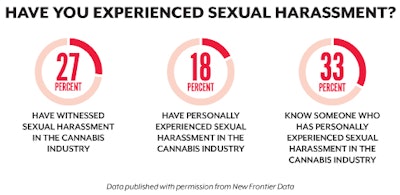
Marijuana dispensaries and grow operations face the same risks and costs related to sexual harassment and misconduct as any other business, but they often do not have the deep pockets of large companies nor a bevy of lawyers to protect themselves. Just one lawsuit can take your dispensary’s profits, create a hostile work environment, damage your company’s reputation, destroy employees’ confidence in management and hurt your ability to retain employees.
It is naive to think that men and women who work together in a dispensary are not going to notice one another, make emotional connections or have interactions outside of work. Additionally, the workplace has become a venue into which workers bring much of their personal lives. Employers must walk a tightrope between an inviting environment and a legally prohibited one.
There are two main types of sexual harassment, which apply to both genders:
1. Using a Position of Power to Exploit Another Employee
This form of sexual harassment involves a person in power basing an employee’s benefits, such as promotions or continuation of employment, on the employee’s acceptance of sexual advances, innuendos or inappropriate touching.
This is considered employer exploitation. In most states, the company is liable for the supervisor’s behavior, and could be liable for lost wages, emotional distress damages, interest and attorney fees.
State laws vary, and dispensary owners should be familiar with their state’s laws governing sexual harassment by supervisors and co-workers. Some state laws also take into consideration whether the company or management knew, or should have known, about the harassment, yet failed to take immediate and appropriate action. If the employer knew of the harassment, it could also be on the hook to pay punitive damages.
2. Creating a Hostile Work Environment Through Inappropriate Actions or Words
Hostile work environment (HWE) sexual harassment consists of harassing conduct such as sexual innuendos, slurs, intimidation, groping, grabbing and hugging. Managers, co-workers, subordinates and even owners can engage in conduct that creates a HWE. A single instance of harassment could create a HWE if it is severe enough, and multiple acts of subtle harassment could also create a HWE if they are pervasive enough.
An employee does not have to be the target of inappropriate conduct to file a claim. An employee who witnesses her co-workers being groped and propositioned can bring a claim for HWE sexual harassment.

Preventative Measures
The level of prevention you have in place can be determined by your answers to these questions:
- Have you specified and articulated your dispensary’s policies regarding appropriate employee behavior? Do these policies include behavior outside of work? Dating between co-workers? Holiday parties?
- Most states hold the employer responsible for preventing sexual harassment at work-related events, regardless if they are on work property.
- Do you have regular staff meetings with employees to discuss your company’s zero-tolerance policy regarding sexual harassment?
- Are the state and federal posters regarding current Employment Notices posted in a conspicuous place?
- Do you have an employment handbook containing specific policies and explanations regarding appropriate workplace behavior?
Examples of Workplace Sexual Harassment
Asking a co-worker on a date. If your dispensary doesn’t have a written policy against employees dating one another, you should enforce a “reasonableness” rule. If a co-worker wants to ask out another co-worker, and that person is not interested, then there should not be a second request. Repeated date requests may constitute harassment.
A manager or a person in positional power (someone who influences wages and promotions, for example) should refrain from asking out employees.
Sharing the love with a hug. One person’s idea of private space can be very different from another’s. Thus, while you may think hugging an employee or co-worker is a natural display of affection, the one being hugged may consider it unwanted sexual behavior. The best policy is for all employees—regardless of position or rank—to avoid body contact.
Neglecting dress code standards. Dispensary employees should always be dressed appropriately. Define the company’s expectations regarding appropriate attire that reflects the dispensary’s brand and reputation. This information should be in the employee handbook and discussed at the time of hire. Employees can’t be expected to follow a policy if they are not aware of it. If an employee fails to meet the dispensary’s dress code standards, then management should follow these six steps:
- Publicize the policy and provide specific examples of attire that violates the policy.
- Talk privately with the employee to determine if he or she realizes his or her attire is in violation of the policy. Always have another co-worker or manager present as a witness.
- Use the employee handbook to guide the discussion.
- Tell the employee you do not want to offend or embarrass him or her. State the issue with the employee’s attire. Show the employee where the dress code policy is contained in the handbook.
- Determine if the attire can be corrected without sending the employee home. For example, put on a sweater, add a scarf, change from skirt to jeans, put on a uniform or a dispensary jacket.
- Send the employee home to change if other options are not available.
- Let the employee know that continued violations of the policy could lead to disciplinary action.
Telling an inappropriate joke. The key here is whether a “reasonable person” would find the joke offensive. It doesn’t matter if you or the person to whom you told the joke finds it harmless. A third person within earshot of the joke could find it offensive and report it as such. If one or more co-workers often tell sexually implicit or discriminatory jokes in your dispensary, it could be determined that a hostile work environment has been created.
Basic Prevention Steps
Creating and disseminating a written policy and reporting procedure is crucial. This policy shows the dispensary owner/operator is taking all reasonable steps to prevent harassment, and that he or she will take appropriate action if it occurs. Some states impose liability on employers for the conduct of their supervisors and managers regardless of best efforts. Because this distinction is important, the dispensary owner/operator is advised to consult with an employment attorney well versed in both federal and state law.
The impact of sexual harassment in your dispensary affects everyone. A hostile work environment can make employees uncomfortable, to say the least. Employees may not want to work for you if they feel the situation could happen again, that they could be subject to retaliation, or if they feel you ignored the situation and shielded the harasser. Studies suggest that perceptions of an organization’s unresponsiveness to harassment leads to “bystander stress” and lower job satisfaction.
Sexual harassment has a negative and demoralizing effect on your entire operation. While you cannot control every aspect of people’s behavior in your business, it is possible to take proactive measures to avoid the threat of a lawsuit and damages. The situation is dependent upon the type of working environment that you create and support. Communication about your dispensary’s sexual harassment policies, regular reminders about the information contained in your employee handbook, and modeling the behavior you want to see in your employees will create a positive and productive work environment that will enhance your business.


























